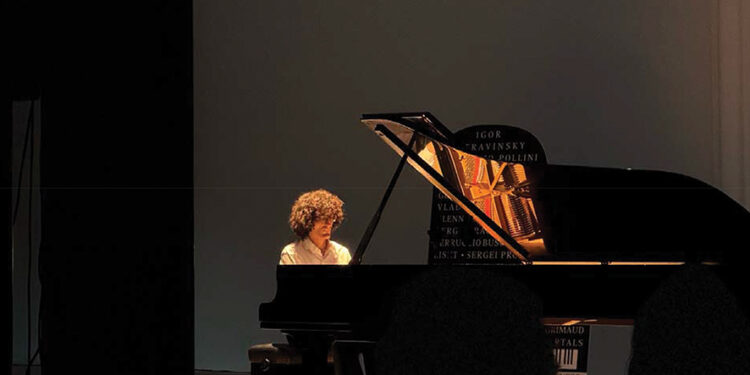In a culture that often seeks refuge in the velvety certainties of Chopin or the romantic escapism of Rachmaninoff, Giorgi Gigashvili’s June 16 recital at the Georgian Philharmonic Orchestra Auditorium arrived like a serrated edge. An ambitious soloist tackling all three of Sergey Prokofiev’s “War Sonatas”—Nos. 6, 7, and 8—is not just a pianist making a statement. It’s a political, emotional, and philosophical confrontation. On this stage in Tbilisi, where Soviet ghosts still occasionally walk among us, Gigashvili didn’t just perform music. He entered into dialectical warfare with the material, with the era, with the instrument.
Gigashvili—long regarded as a meteoric presence on the Georgian and European scenes, moving with unsettling ease between jazz improvisation and classical rigor—has now planted himself squarely in the lineage of pianist-thinkers. With this program, he turned away from stylistic pluralism and embraced something monolithic: three sonatas forged in wartime metal, each pulsing with paranoid tension, formal audacity, and tectonic force. It was not a night of aesthetic comfort. It was a night of danger.
The evening began with the Piano Sonata No. 6 in A major, Op. 82, and with it, a landscape of shattered tonality and twitching memory. Prokofiev’s Sixth, composed in 1939–40, carries the bleak symmetry of a totalitarian dream turned nightmare: its opening chords are like ruins already half-buried.
Gigashvili’s approach was unflinching—no rhetorical softening of the harsh angles, no attempt to domesticate the brutal first theme. His articulation was skeletal, almost clinical at times, revealing the structure’s mechanical logic. Yet it was not cold. On the contrary: his dynamic control and pedaling kept the dissonances hovering like psychological vapor, subtly unstable. The second movement’s waltz was not danced but stalked—a dream that turns grotesque midway through.
Where many pianists inject pathos into the final Vivace, Gigashvili opted for something sterner: an acceleration that bordered on manic, conjuring a sense of a man fleeing his own reflection. The final chords—violent, unresolved—landed not as closure but collapse.
Now the audience returned to the more familiar (and more dreaded) territory of Sonata No. 7 in B-flat major, Op. 83. If the Sixth sonata gazes into the mirror of war, the Seventh walks straight into the inferno. Written in 1942 and premiered by Richter under Stalin’s anxious gaze, this sonata has become a terrifying classic—a kind of litmus test for the modern pianist’s psychological and physical limits.
Gigashvili passed this test by breaking it. He refused to deliver the Seventh as a heroic display of virtuosity. Instead, he dragged it, breath by breath, through layers of inner resistance.
The opening movement, with its obsessive three-note motif, was hammered into the keyboard like a Morse code of fear. Here, Gigashvili’s phrasing turned brutalist: short, clipped, almost percussive, reducing the piano to a box of rhythm and noise. The slow movement, Andante caloroso, was whispered with such restraint it felt like the aftermath of an interrogation—the melody barely daring to exist.
And then, the final Toccata-like Precipitato. Often taken as a triumphant race to the finish, Gigashvili’s version was mechanical, almost dystopian—a runaway train with no driver. There was no victorious gesture at the end, only a machine’s convulsion. If you closed your eyes, you could almost hear bombs falling in the chords.
The final sonata of the night, No. 8 in B-flat major, Op. 84, is the most complex of the three. Composed in 1944, it is longer, more ambiguous, and—paradoxically—the most lyrical. But this is not the lyricism of peace. It is the nostalgia of someone who knows they are being watched.
After intermission, Gigashvili leaned into this tension with extraordinary sensitivity. The first movement’s wandering themes were spun out with a peculiar kind of slow burn: every phrase was allowed to drift, hesitant, unstable. It was like watching a man remember something too painful to describe.
But perhaps the most striking part of the entire recital came in the second movement, the Andante sognando. Here, Gigashvili found a sound-world entirely his own: not just dreamlike, but distorted, like a reel of film melting in the projector. It was haunting, even surreal, with tiny hesitations and touches of rubato that turned each phrase into a kind of question.
The final Vivace movement, with its angular rhythms and off-kilter folk echoes, was no resolution. Gigashvili resisted the urge to rush; instead, he unfolded the movement as a farewell to clarity. By the end, the music seemed to be escaping from itself.
To play all three War Sonatas in a single evening is a statement. To do so in Tbilisi, a city still metabolizing its post-Soviet dissonances, is an act of cultural clairvoyance. Prokofiev’s sonatas are more than music—they are historical documents encoded in sonic form, recording the spiritual corrosion of a society under authoritarian pressure.
Gigashvili’s recital was not “beautiful” in the sentimental sense. It was something far rarer: necessary. It asked the audience to listen not with ears, but with memory. Not with taste, but with ethics. This was Prokofiev as trauma—Prokofiev as resistance—Prokofiev as modernity’s cracked mirror.
And Giorgi Gigashvili? He did not perform these sonatas. He survived them. Sergey Prokofiev composed the “War Sonatas” between 1939 and 1944, a period marked by Stalinist terror, global conflict, and artistic repression. Sonata No. 6 explores fragmentation and paranoia; No. 7 embodies terror and mechanized violence; No. 8 drifts into memory, nostalgia, and quiet despair. Together, they form a triptych of modern existential unease. Performing them today is not just an artistic challenge—it is an invitation to revisit the unresolved tensions of 20th-century history and to reconsider music as a medium of historical memory. If this recital is any indication, Gigashvili is not here to decorate the past. He is here to interrogate it.
Review by Ivan Nechaev














